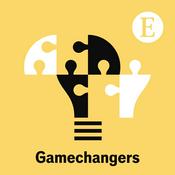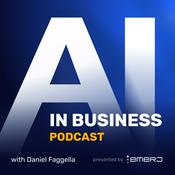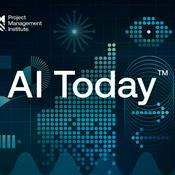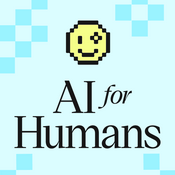Where AI Works: Conversations at the Intersection of AI and Industry
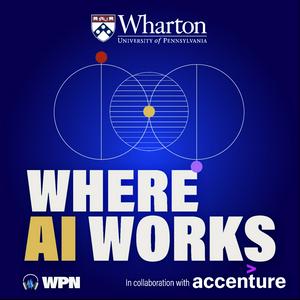
17 episodes

Beyond the Hype: Peter Cappelli on Where AI Boosts Productivity, and Where It Just Doesn’t
11/20/2025 | 1h
This week, we’re doing something different. Instead of our usual episodes, we’re sharing a special conversation featuring “Where AI Works” season 3 host Peter Cappelli on the podcast “Using AI at Work.” It’s a timely, unfiltered look at how companies are actually trying, and often failing, to implement AI.In this interview, Peter brings his decades of research at Wharton to dismantle the biggest myths leaders believe about AI adoption:Why boards are obsessed with headcount reductions, and why that’s the wrong metricThe real reasons only ~5% of companies are meaningfully implementing AIWhat executives get wrong when they chase “off-the-shelf” AI solutionsHow job redesign, not job elimination, is where the true productivity gains come fromThe surprising truth about employee cooperation: guaranteeing jobs may actually speed up AI progressHe also breaks down two real-world case studies, including Ricoh’s attempt to automate insurance paperwork and a manufacturing company’s AI-driven quality control system, revealing what actually works, what doesn’t, and why AI projects fail long before the technology does.If you’re a leader trying to separate hype from reality, or if you want to understand how AI reshapes work without erasing workers, this conversation is essential listening.

Host's Cut: Reflections on Season Three
10/30/2025 | 10 mins.
AI isn’t just a technology story — it’s an organizational one. From talent and transformation to data and decision-making, this season of Where AI Works uncovers how top executives are building the structures and the mindsets that make AI work at scale.On this special recap and review episode, host Peter Cappelli looks back at the key takeaways from his conversations with Karalee Close, the Global Lead for Talent & Organization at Accenture; Vivian Sun, the Senior Director of Data & AI, Enterprise Architecture and IT Transformation at Jabil Incorporated; Greg Ulrich, the Chief AI & Data Officer at Mastercard; and Sohaib Perwaiz, the Group Business Engagement Lead at RBC Borealis. In each conversation, you’ll hear a first-hand perspective on how they’re guiding their companies through this transformational time, balancing innovation with governance, and experimentation with measurable business value. You’ll also get more of Peter’s expert analysis, including two important observations for any business leaders grappling with AI implementation within their own organizations. Episode Highlights:2:47 - Karalee explains how implementing AI requires a deep understanding of the roles and tasks within an organization, in order to re-skill employees as needed.4:39 - Vivian talks about the first AI use-case within her organization, and how it served as a way to gain attention and support from executives.6:42 - Greg discusses how AI implementation at MasterCard required not just alignment from internal stakeholders, but buy-in from other external partners as well.8:36 - Sohaib shares RBC’s perspective on the importance of keeping “humans-in-the-loop”, especially as it relates to client relationships.

From Call Volume to Client Value: AI in the Banking Sector
10/16/2025 | 23 mins.
What happens when the volume and complexity of client needs outpace the capacity of even the world’s biggest banks? And how can AI move beyond efficiency tools to actually enrich client conversations, deepen relationships, and reimagine frontline service?On this episode of Where AI Works, host Peter Cappelli sits down with Sohaib Perwaiz, the Senior Director of Business Advisory at RBC Borealis — the Royal Bank of Canada’s enterprise AI solution development hub and center of excellence. Their conversation explores how AI is being applied across the enterprise, including inside the bank’s advice center, where generative AI is helping thousands of human advisors reduce call times, surface insights from vast pools of transaction data, and transform routine problem-solving into personalized financial guidance. This episode also unpacks the organizational realities of scaling AI in a highly regulated industry: how to design solutions that empower rather than replace employees, how to align technology with real business pain points, and why shifting from “shiny object” experimentation to value-driven implementation is critical for banks and other companies as they navigate the AI era. Episode Highlights:4:49 - Sohaib describes how generative AI is being applied within RBC’s call center to improve both productivity and the client experience.11:21 - Sohaib explains why he thinks augmenting human agents with AI adds more value than replacing them with AI-powered chatbots entirely.17:24 - Sohaib lays out how RBC is using machine learning to drive greater client retention in the mortgage aspect of its business.

Trust and Transactions: How Mastercard Is Doing AI Differently
10/02/2025 | 21 mins.
What happens when AI isn’t just an add-on or a nice-to-have, but becomes part of the backbone of global commerce? And how can agentic AI be implemented successfully in an ecosystem that’s historically treated bots as malicious or fraudulent actors?On this episode of Where AI Works, host Peter Cappelli sits down with Greg Ulrich, the Chief AI and Data Officer at Mastercard, to explore how one of the world’s leading payment technology companies is embedding AI across its enterprise. From internal copilots and onboarding tools to its groundbreaking “Agent Pay” initiative, the company’s goal is to both improve productivity and to create secure, trusted systems that allow AI agents to carry out transactions on behalf of consumers and businesses alike. Their conversation also goes beyond the technology to highlight the leadership, cultural, and organizational shifts required to scale AI in such a highly regulated industry, and why cross-enterprise collaboration is as critical as the algorithms themselves. Episode Highlights:5:44 - Greg lays out how online shopping and search are being augmented with agentic AI to give customers greater flexibility without compromising security.11:04 - Greg explains how Mastercard separates legitimate transactions from fraudulent ones, and the increasing role of AI in making that determination.16:45 - Greg discusses the variety of agentic systems working within Mastercard and how they work together to provide a seamless experience for the end-user.

Start Small, Think Big: Making AI Stick
9/18/2025 | 24 mins.
AI transformation isn’t about flashy tools — it’s about strategic wins that build momentum and deliver real business value.On this episode of Where AI Works, host Peter Cappelli is joined by Vivian Sun, the Senior Director of Data & AI, Enterprise Architecture, and IT Transformation at Jabil Incorporated, one of the world’s largest and most quietly influential contract manufacturers. Sun shares how her company scaled AI across its global operations — not by chasing hype, but by starting with tangible use cases that delivered measurable impact. As you’ll hear, Jabil’s journey began with AI-powered computer vision, replacing tedious and error-prone visual inspections. From there, it moved into machine learning for color calibration in manufacturing — transforming decades of tacit worker knowledge into predictive models. They then layered in generative AI to enhance compliance with trade regulations, using AI as both a decision-making assistant and a validation tool. Sun emphasizes that successful AI adoption demands more than tech — it needs executive buy-in, change management, and a relentless focus on business value. Her advice? Start small, but think big, and treat AI not as a tool, but as a company-wide transformation.Episode Highlights:6:00 - Vivian discusses how Jabil’s AI journey focused on three core technologies; AI computer vision, machine learning, and generative AI.11:31 - Vivian explains how early use-cases of AI at Jabil paved the way for further implementation by revealing a direct impact on business, educating employees, and building confidence among executives.16:58 - Vivian and Peter unpack how generative AI can be used in tandem with machine learning to validate or improve the information gleaned from a company’s data.
More Technology podcasts
Trending Technology podcasts
About Where AI Works: Conversations at the Intersection of AI and Industry
Listen to Where AI Works: Conversations at the Intersection of AI and Industry, Hard Fork and many other podcasts from around the world with the radio.net app

Get the free radio.net app
- Stations and podcasts to bookmark
- Stream via Wi-Fi or Bluetooth
- Supports Carplay & Android Auto
- Many other app features
Get the free radio.net app
- Stations and podcasts to bookmark
- Stream via Wi-Fi or Bluetooth
- Supports Carplay & Android Auto
- Many other app features


Where AI Works: Conversations at the Intersection of AI and Industry
download the app,
start listening.

















